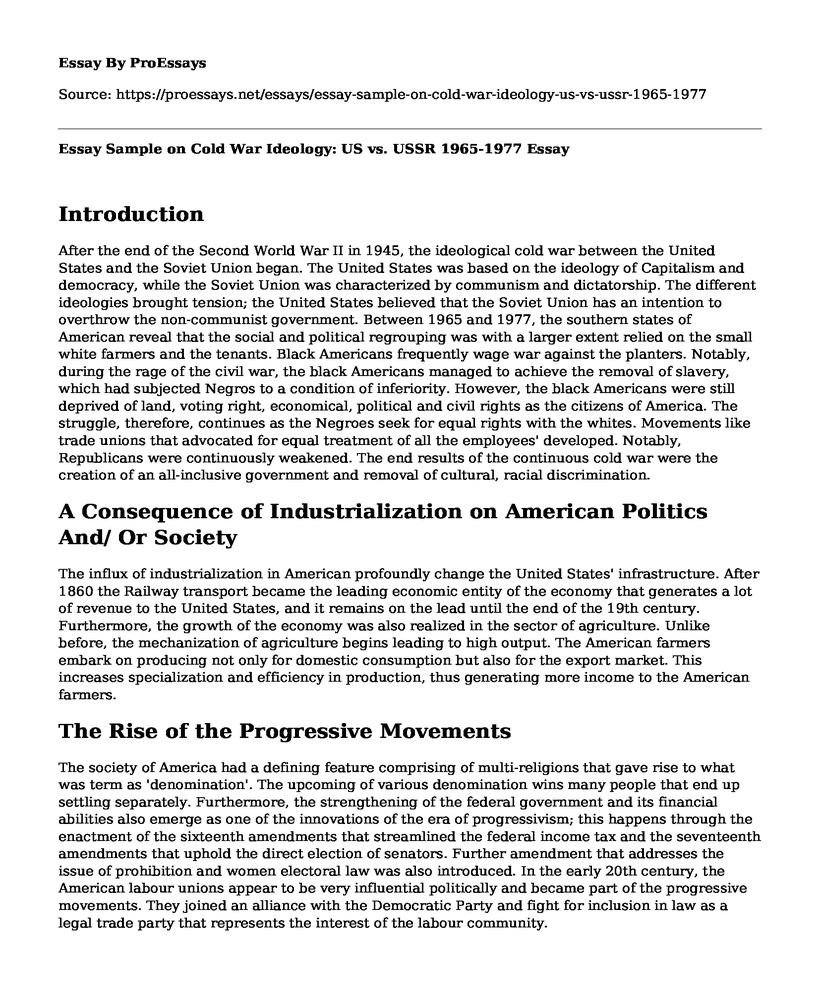Introduction
After the end of the Second World War II in 1945, the ideological cold war between the United States and the Soviet Union began. The United States was based on the ideology of Capitalism and democracy, while the Soviet Union was characterized by communism and dictatorship. The different ideologies brought tension; the United States believed that the Soviet Union has an intention to overthrow the non-communist government. Between 1965 and 1977, the southern states of American reveal that the social and political regrouping was with a larger extent relied on the small white farmers and the tenants. Black Americans frequently wage war against the planters. Notably, during the rage of the civil war, the black Americans managed to achieve the removal of slavery, which had subjected Negros to a condition of inferiority. However, the black Americans were still deprived of land, voting right, economical, political and civil rights as the citizens of America. The struggle, therefore, continues as the Negroes seek for equal rights with the whites. Movements like trade unions that advocated for equal treatment of all the employees' developed. Notably, Republicans were continuously weakened. The end results of the continuous cold war were the creation of an all-inclusive government and removal of cultural, racial discrimination.
A Consequence of Industrialization on American Politics And/ Or Society
The influx of industrialization in American profoundly change the United States' infrastructure. After 1860 the Railway transport became the leading economic entity of the economy that generates a lot of revenue to the United States, and it remains on the lead until the end of the 19th century. Furthermore, the growth of the economy was also realized in the sector of agriculture. Unlike before, the mechanization of agriculture begins leading to high output. The American farmers embark on producing not only for domestic consumption but also for the export market. This increases specialization and efficiency in production, thus generating more income to the American farmers.
The Rise of the Progressive Movements
The society of America had a defining feature comprising of multi-religions that gave rise to what was term as 'denomination'. The upcoming of various denomination wins many people that end up settling separately. Furthermore, the strengthening of the federal government and its financial abilities also emerge as one of the innovations of the era of progressivism; this happens through the enactment of the sixteenth amendments that streamlined the federal income tax and the seventeenth amendments that uphold the direct election of senators. Further amendment that addresses the issue of prohibition and women electoral law was also introduced. In the early 20th century, the American labour unions appear to be very influential politically and became part of the progressive movements. They joined an alliance with the Democratic Party and fight for inclusion in law as a legal trade party that represents the interest of the labour community.
Role of American Imperialism in Hawaiian Aannexation
The American military and economic expansion to Asia began at the end of the 19th century. The annexation to Asia was followed by the establishment of the military base at Hawaii islands, which act as a strategic point to expand and control part of Asia. The first attempt on annexation fails to pass in US congress. In 1987 the representatives of the Hawaiian Islands managed to convince the congress, and a resolution was made to embark on the annexation this, of course, provides authority to begin the process of expanding the US kingdom which finally they control the whole of East Asia.
Bibliography
Brody, David. Visualizing American Empire: Orientalism and imperialism in the Philippines. University of Chicago Press, 2010. https://doi.org/10.7208/chicago/9780226075303.001.0001
Domosh, Mona. American commodities in an age of empire. Taylor & Francis, 2006. Ikenberry, G. John. "Liberalism and empire: logics of order in the American unipolar age." Review of International Studies 30, no. 4 (2004): 609-630. https://doi.org/10.1017/s0260210504006254
Northrup, David. Indentured labour in the age of imperialism, 1834-1922. CUP Archive, 1995. https://doi.org/10.1086/ahr/102.3.783
Cite this page
Essay Sample on Cold War Ideology: US vs. USSR 1965-1977. (2023, Jan 28). Retrieved from https://proessays.net/essays/essay-sample-on-cold-war-ideology-us-vs-ussr-1965-1977
If you are the original author of this essay and no longer wish to have it published on the ProEssays website, please click below to request its removal:
- Homeland Security: Preparedness, Prevention, and Deterrence
- The Twentieth Century and the African Americans - Paper Example
- Clinton Impeachment Trial (1999) Essay Example
- Criminal Investigation on the War Crime Paper Example
- Research Paper on Climate-Change Policies for Low Carbon Transition
- Essay Example on Nebuchadnezzar's Babylon
- The Mexican-American War: An Unprepared Mexican vs. U.S. President Polk - Essay Sample







